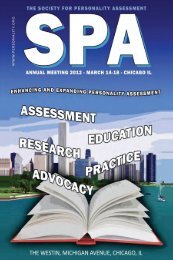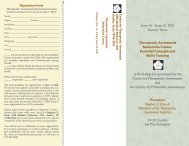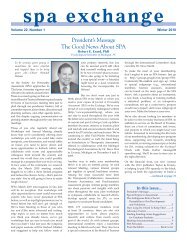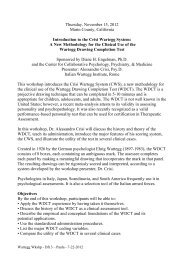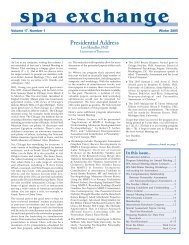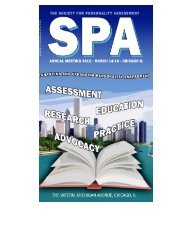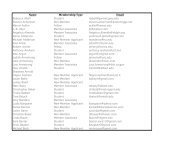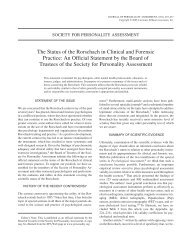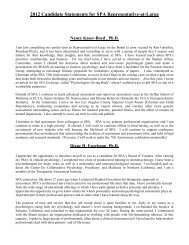From Routledge Journals - Society for Personality Assessment
From Routledge Journals - Society for Personality Assessment
From Routledge Journals - Society for Personality Assessment
Create successful ePaper yourself
Turn your PDF publications into a flip-book with our unique Google optimized e-Paper software.
<strong>Personality</strong> Disorder. Cases of prisoners who committed seriousoffenses, each of whom was administered the PCL-R, MMPI-2,and Rorschach, will be presented to illustrate how findingsfrom the PCL-R can be integrated with findings from the MMPI-2 and Rorschach. The strengths and limitations of eachinstrument will be discussed. Brief videotapes of these offenderswill be shown so workshop participants can <strong>for</strong>m a vivid “mentalpicture” of what these offenders are like.Goals and Objectives:1. Review the conceptualization of psychopathy.2. Describe administration, scoring, and interpretation of thePCL-R.3. Discuss similarities and differences in the definitions ofpsychopathy and Antisocial <strong>Personality</strong> Disorder.4. Illustrate ways to integrate findings from the PCL-R withfindings from the MMPI-2 and Rorschach.5. Identify strengths and limitations of each instrument <strong>for</strong>specific assessment issues in <strong>for</strong>ensic contexts.Skill Level: This is an intermediate level workshop.Workshop #4Legal Ethical Risks and Ethical Risk Managementin Professional Psychological PracticeJeffrey N. Younggren, Ph.D.University of Cali<strong>for</strong>nia, Los Angeles School of Medicine,Los Angeles, CAFor the last ten years, there has been a major increase in thenumber of lawsuits, licensing board complaints, and ethics committeecomplaints against clinical psychologists. As managedcare continues to dominate third party reimbursement in boththe private and public sectors, any adverse disciplinary eventcan make it difficult, if not impossible to meet credentialingrequirements. The changes in the economic system have ledto changes in therapeutic approaches and business organizationsthat, in turn, have increased the complexity of the legaland regulatory environment. In these difficult times, a riskmanagement strategy is an essential element of professionalpractice. After providing a basic introduction to identifying legaland ethical risks involved in working with high risk patientsand situations, this workshop will focus on three specializedareas of practice: working with couples and families, involvementwith lawyers and the legal system, and working withpotentially suicidal clients. The primary workshop goal is toallow practitioners to identify potential legal and ethical problemsin these areas so that risks of lawsuits and disciplinarycomplaints can be minimized. Dr. Younggren will suggest strategieswhich will make it more likely that a psychologist willprevail if she/he is un<strong>for</strong>tunate enough to be the target of thesesometimes unavoidable events. The program will describe howand when practitioners can utilize the APAIT Advocate 800Risk Management Consultation Service as part of their ownrisk management strategies. The workshop is primarily directedto psychologists in private practice but it applicable to all siteswhere health services are provided.2010 WORKSHOPS - MARCH 24Goals and Objectives:1. Provide basic strategies <strong>for</strong> identifying high risk situations andmanaging professional practice risks.2. Describe how to manage interactions with lawyers and the legalsystem, including responding to subpoenas and other in<strong>for</strong>mationrequests, providing testimony at depositions and in court, and usingstrategies <strong>for</strong> interacting with attorneys.3. Describe how to manage potential conflicts in conjoint treatmentwith couples and families, with particular emphasis on thespecial risks associated with divorce.4. Prepare essential risk management strategies <strong>for</strong> identifyingand managing outpatient suicide risk.5. Describe ethical and legal standards governing these areas ofpractice.Skill Level: The workshop is primarily directed to psychologists inprivate practice, but it is applicable to all sites where health sciencesare provided.Wednesday, March 24, 20108:00 am - 11:30 amHalf-Day, 3.5 CE CreditsWorkshop #5An Introduction to Early Memories ProcedureInterpretationArnold R. Bruhn, Ph.D.Chevy Chase, MDThe Early Memories Procedure (EMP) is best used at the beginningof therapy to assess major unresolved issues that have unconsciouslymotivated the client to seek therapy at this time. Thus thepresenting problem (“I’ve been depressed <strong>for</strong> six months”) can beviewed from a more relevant perspective (memory issue: ‘Peopleclose to me keep dying or leaving me’). Often clients lack insight asto what is causing their lives not to work, and we as clinicians mustdeduce the dysfunction be<strong>for</strong>e we can be of much help.The EMPwas designed with a two major purposes in mind: to help cliniciansfigure out by the end of the second session what really broughttheir client in to therapy; and just as important, to help clientsbetter understand how they function and ‘what is wrong with them’—to teach psychological mindedness, in so many words. Secondarily,such work demystifies the work of psychotherapy and reducesunproductive anxiety—the client’s feeling helpless and out ofcontrol. Proceeding in this manner helps to build trust in their therapistand the therapy process—by the end of the second session,clients know why they are there, what in their lives is not working,and what they must do to make things right. Once clients understandwhat the problem is, they are less likely to drop out andmore likely to believe the therapist knows what s/he is doing.Goals and Objectives:1. Provide a structured method to interpret memories reliably (asine qua non of the scientific method).2. Introduce the EMP and discuss how to use it at the beginningof therapy.3. Identify the major unresolved issue that brought the clientinto therapy.To register visit: www.personality.org / 7



